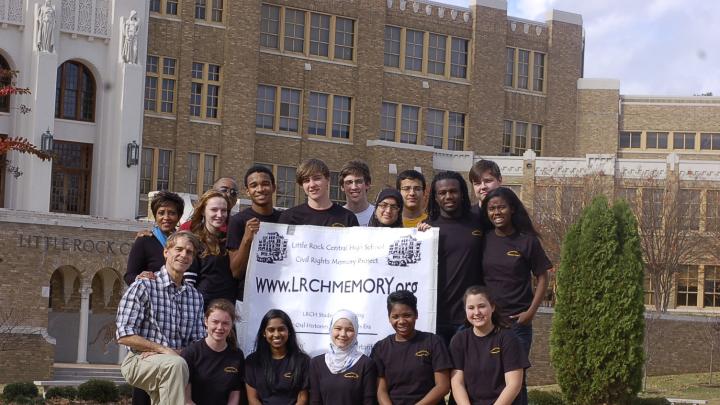As a teacher, George Dickey West ’72 lives “to learn something new every day.” He believes his profession requires “living with a clear head, without preconceptions”—which, he adds, “can be a challenge in the classroom.”
He did not reach that classroom in his native Little Rock by a straight and narrow path. Adventure and curiosity have always driven him: he applied to Harvard on a lark and, when accepted, enrolled sight unseen. “I like to see my ‘career’ as a verb—as in when it means ‘careen’—to veer right and left,” he says. Undergraduate volunteer work in education led to similar work in San Francisco, followed by oral-history recording and documentary-making in Arkansas, to teaching ninth-grade civics and advanced-placement economics at Little Rock Central High.
“I try not to think just of teaching a subject; I need to teach the children right in front of me,” he says. If his students are bored, he considers it his fault, not theirs. He knows he will reach them only if he finds ways to connect their life experiences with the material he’s trying to teach.
This drive to forge connections between curriculum and student experience led him to begin the Little Rock Memory Project. Already an advocate of oral history, he was further inspired by the visit to Central High of three young Japanese Americans who’d gathered stories from relatives interned near Little Rock during World War II and then shared those accounts at local schools. West was struck by how this direct and honest form of storytelling resonated with his ninth-graders, and wondered if he could find stories for them to tell.
This was in 2005—two years before the fiftieth anniversary of the integration of Little Rock Central High in the wake of Brown v. Board of Education. West therefore charged his students to go out and “hear the stories” of their parents, grandparents, and friends—black or white, native Arkansan or recent arrival, about their experiences in the civil-rights era. The students then gathered the stories together as a blog (http://lrchmemory.org/wordpress) so they could read each other’s stories, paint a nuanced picture of the story of integration in Little Rock, and share their work with other students and the community.
What West thought would be a one-year project proved too good a teaching tool to drop. He decided all the ninth-graders should undertake the project—both to understand the history of their school building and to learn to “broach difficult topics” through listening and storytelling. In 2009, he received a grant from the Learn and Serve America program of the Corporation for National and Community Service that paid for the publication of 300 student essays as a book: Beyond Central, Toward Acceptance: A Collection of Oral Histories from Students of Little Rock Central High. A second volume of essays, Mapping the Road to Change: Insights on Perception, Prejudice, and Acceptance through Oral History, will be released in January.
The Memory Project has convinced West that the time has come in Little Rock to talk about the legacy of race. He says that “talking about it makes a difference” and that his goal is to help his students create “a bridge between divergent backgrounds.” By working together to tell narratives, his students are teaching each other to value difference in human experience, to see how these different experiences share threads of human emotion, and to learn “what we are able to create when we come together.”









